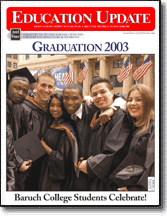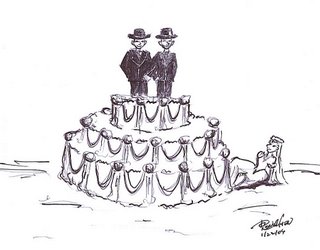Thursday, June 08, 2006
Dowd, Friedman, The New York Times and a Brighter Tomorrow

Two excellent, and somewhat related, op ed pieces came out today that deserve some attention. The first, A Well of Smiths and Xias, by Thomas L. Friedman, is an optimistic piece about the diversity of US society, and the second piece, Damien, Demons and Dubya, by Maureen Dowd, who examines the use of the ban on gay marriage as a “boogeyman” to divert attention from the real issues of the country. Thanks to David’s Ben Shuldiner for Congress site, which printed both pieces in their entirety.
 I loved the Friedman piece. It chronicles his attendance of a high school graduation, and his surprise at the diversity of the graduating class. Friedman points to the US as still a beacon of hope for people all over the world, and the immigrants our society attracts as “our oil well – one that never runs dry”, indeed providing the US with its greatest resource: people.
I loved the Friedman piece. It chronicles his attendance of a high school graduation, and his surprise at the diversity of the graduating class. Friedman points to the US as still a beacon of hope for people all over the world, and the immigrants our society attracts as “our oil well – one that never runs dry”, indeed providing the US with its greatest resource: people.
But if there is one reason to still be optimistic about America it is represented by the stunning diversity of the Montgomery Blair class of 2006. America is still the world's greatest human magnet. We are not the only country that embraces diversity, but there is something about our free society and free market that still attracts people like no other. Our greatest asset is our ability to still cream off not only the first-round intellectual draft choices from around the world but the low-skilled-high-aspiring ones as well, and that is the main reason that I am not yet ready to cede the 21st century to China. Our Chinese will still beat their Chinese.
Of course I see other countries as embracing diversity as well, with some real shining examples in Europe, but the sentiment is right on target. This is why it is so essential to preserve our liberties, and uphold the constitution. The society we have created (and yes, we contribute to its creation on a daily basis) is the true draw of this country, it’s what makes us special, and attracts the flow of immigrants that compose American society.
 Maureen Dowd’s piece is much less optimistic, but equally important. Dowd looks at the various villains used by the Bush presidents, Sr. and Jr., to divert public attention from vital issues. And she points to Bush’s recent push for a ban on same-sex marriage as another example of this practice.
Maureen Dowd’s piece is much less optimistic, but equally important. Dowd looks at the various villains used by the Bush presidents, Sr. and Jr., to divert public attention from vital issues. And she points to Bush’s recent push for a ban on same-sex marriage as another example of this practice.
W. ignored the gay marriage issue in the 19 months after he used it to help him stay in the White House. To reprise it now, knowing it has no chance of passing, is so transparent that surely even the most blinkered ''values'' voters see through it.
She also points out that Bush may actually be showing signs of recognizing that he is only spouting rhetoric, and that he has become, if not the worst president in modern history, certainly they least effectual in this time of multiple crises.
Even as W. gave a speech here promoting a constitutional amendment designed to demonize and discriminate against a group of Americans who have done nothing wrong, his heart did not seem in it. A Democratic strategist noted on CNN that the president looked as cowed as ''a long-tailed cat in a room full of rocking chairs.''
Both pieces are eloquent and well written, and bring up points which deserve attention. But both come from the perspective that the world is, more or less, doomed, with Friedman showing one point of hope, and Dowd looking at the hiding of the problems. And certainly, the country faces many huge and seemingly insurmountable challenges today. But we also need to remember that there are many reasons for optimism.

Now I must say I’m as guilty (or more guilty) as the next guy for focusing on the difficulties we face and ignoring the promise, but this is predominantly because I believe that we can do things to prevent the worst from happening on these issues. I try to always keep in mind the wonderful things about the time we live in, and to try to look for the solutions behind these problems.
But there is tremendous reason for optimism. Advances in medicine have alleviated some of the worst diseases, and eased the suffering from some of the presently incurable diseases. Advances in communication have allowed people from so many societies to get to know each other, and about their societies, so that while governments may not get along citizens are beginning to understand each other.
The development of higher social consciousness emphasizes cases where people don’t enjoy freedoms. Many of the issues of war, hatred, genocide, discrimination, sexism, and more have been around for thousands of years, but only in the light of the evolving global morality do these issues become so pronounced.
 We are at a crossroads today, and the crossroads are always tumultuous. But if we make the right choices, and stay along the path, the road ahead seems amazing. Now we need to put in the hard and smart work to achieve it.
We are at a crossroads today, and the crossroads are always tumultuous. But if we make the right choices, and stay along the path, the road ahead seems amazing. Now we need to put in the hard and smart work to achieve it.
technorati tags: Thomas L. Friedman, Maureen Dowd, A Well Of Smiths And Xias, Damien, Demons, And Dubya, Gay Marriage, Diversity, Optimism, New York Times
Posted by Scottage at 3:07 AM /
| |




 I loved the Friedman piece. It chronicles his attendance of a high school graduation, and his surprise at the diversity of the graduating class. Friedman points to the US as still a beacon of hope for people all over the world, and the immigrants our society attracts as “our oil well – one that never runs dry”, indeed providing the US with its greatest resource: people.
I loved the Friedman piece. It chronicles his attendance of a high school graduation, and his surprise at the diversity of the graduating class. Friedman points to the US as still a beacon of hope for people all over the world, and the immigrants our society attracts as “our oil well – one that never runs dry”, indeed providing the US with its greatest resource: people. Maureen Dowd’s piece is much less optimistic, but equally important. Dowd looks at the various villains used by the Bush presidents, Sr. and Jr., to divert public attention from vital issues. And she points to Bush’s recent push for a ban on same-sex marriage as another example of this practice.
Maureen Dowd’s piece is much less optimistic, but equally important. Dowd looks at the various villains used by the Bush presidents, Sr. and Jr., to divert public attention from vital issues. And she points to Bush’s recent push for a ban on same-sex marriage as another example of this practice. 
 We are at a crossroads today, and the crossroads are always tumultuous. But if we make the right choices, and stay along the path, the road ahead seems amazing. Now we need to put in the hard and smart work to achieve it.
We are at a crossroads today, and the crossroads are always tumultuous. But if we make the right choices, and stay along the path, the road ahead seems amazing. Now we need to put in the hard and smart work to achieve it.